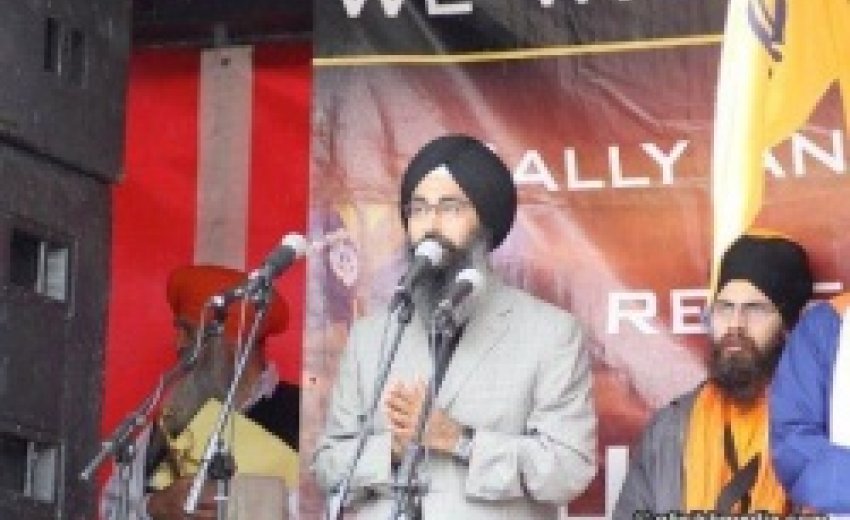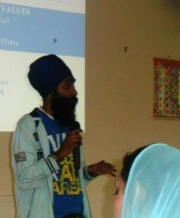|
‘Misl Inglad’: Conversations on Anything Sikhi Tuesday, June 26, 2012, London — Sikh Research Institute (SikhRI) spent the early part of June on a “4G Tour” of the United Kingdom, exploring the topics of Guru, Gender, Genocide and Gurmata with diverse audiences in cities around Scotland and England. On 8 June, the tour began with a talk by Harinder Singh, chief programming officer for SikhRI, entitled “Suppression of a Nation” at the Guru Nanak Gurdwara in Edinburgh. More than 55 people attended, including local Councillors and politicians.
The next day, at the Guru Nanak Sikh Temple in Glasgow, 40 people attended the talk “Sikhi and Women,” which explores the revolutionary equality for men and women envisioned by the Guru, while taking a hard look current times and the prevalence discrimination, subordination, and gendered foeticide, a rampant problem in the Panjab today.“[It was] an insightful experience,” said Rajvir Kaur, who attended from Paisley. “This opens the door for much needed talks within our communities, especially for parents. They can then pass this down to their own young children. It was excellent for youth as well.”
On 10 June the tour moved to England, where Harinder Singh addressed a gathering of over 5,000 in Trafalgar Square,on “Envisioning the Khalsa Raj in the 21st Century” as part of the London Remembrance March & Freedom Rally, hosted by the Federation of Sikh Organisations. (Watch video below:)
Attendees explored the process and precedent of sarbat khalsa and then put the principals in action through a number of interactive team-based exercises, culminating with a model sarbat khalsa, intended to demonstrate its potential contemporary application. “For me, this workshop has provided an understanding of the process of Sarbat Khalsa and how it can continue to make a difference. It serves as a catalyst for the attendees to begin implement the learning at a local level,” Gurmail Singh of Sri Guru Singh Sabha Reading. "The events presented by Sikh Research Institute during this visit addressed issues of current relevance and, through the Sikh Education Conference and Model Sarbat Khalsa workshop, facilitated the initial steps of exciting community-development initiatives that have the potential to deliver long-lasting effects for the UK Sikh community,” said Jagdeep Singh, SikhRI’s UK coordinator. “We thank all the organisations who helped make this possible, and look forward to working with them to further these efforts in the coming months while continuing to evolve our community-building programs in the UK." |

 Attendees praised the lecture afterward for its straightforward presentation of the history of the events of 1984 and the encouragement they felt to become active politically in practical and impactful ways. “[This talk] has made me look at myself and ask how much of a Sikh I am in my practical life,” said Daljeet Kondel, who also attended from Edinburgh. “The talk has been very informative and challenging.”
Attendees praised the lecture afterward for its straightforward presentation of the history of the events of 1984 and the encouragement they felt to become active politically in practical and impactful ways. “[This talk] has made me look at myself and ask how much of a Sikh I am in my practical life,” said Daljeet Kondel, who also attended from Edinburgh. “The talk has been very informative and challenging.”  Later that afternoon in the same location, Harinder Singh spoke on “Sikhi Inspired Leadership,” a very popular talk that SikhRI offers, which investigates the ways to weave together the lessons of Gurmat with the local and international challenges of the day in order to cultivate impassioned, effective leadership in Sikh communities around the world. Fifty people attended the afternoon’s event, and those who shared feedback after the session said they would recommend this talk to others as the topic was timely and relevant to engaging youth today. “The talk was very thought provoking, with lots of information and insight that makes you think about your own life and behaviour, and what you need to do to be a good Sikh leader,” said H. Gharyal, who attended from Glasgow.
Later that afternoon in the same location, Harinder Singh spoke on “Sikhi Inspired Leadership,” a very popular talk that SikhRI offers, which investigates the ways to weave together the lessons of Gurmat with the local and international challenges of the day in order to cultivate impassioned, effective leadership in Sikh communities around the world. Fifty people attended the afternoon’s event, and those who shared feedback after the session said they would recommend this talk to others as the topic was timely and relevant to engaging youth today. “The talk was very thought provoking, with lots of information and insight that makes you think about your own life and behaviour, and what you need to do to be a good Sikh leader,” said H. Gharyal, who attended from Glasgow.
 The next day, over 80 people gathered at the Oxford Union for a workshop hosted by the Sikh Council UK: “Reviving The Sarbat Khalsa.” Prior to the workshop, Harinder Singh was interviewed about the workshop’s purpose and impact on the show Sikh Think Tank. You can
The next day, over 80 people gathered at the Oxford Union for a workshop hosted by the Sikh Council UK: “Reviving The Sarbat Khalsa.” Prior to the workshop, Harinder Singh was interviewed about the workshop’s purpose and impact on the show Sikh Think Tank. You can